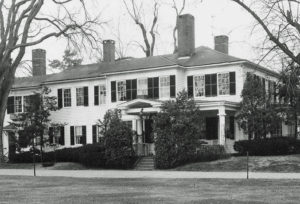True Tales from Canton’s Past: Lost at Sea
By George T. ComeauAt age 58, James Ritchie had accomplished more than 10 men would in a lifetime. Think of a life in chapters or seasons and the storyline becomes clear. Born here in Canton on May 12, 1815, in what is now the Draper House at Pequitside Farm, the young man flourished under the watchful eye of his father, the reverend of the First Parish Church.

James Ritchie was born in the house his father built on Pleasant Street in Canton. (Courtesy of the Canton Historical Society)
Reverend William Ritchie came to Canton as the fourth minister of the church. Historians grandly write that Ritchie “labored in this corner of the Lord’s Vineyard from 1807 to 1820.” A graduate of Dartmouth, Ritchie was a man of letters and flourished here both spiritually and financially. The grand house on Pleasant Street is a testament to his standing in the community. The land was owned by the widow of the previous minister, and when she sold it in 1809 to Ritchie, she moved to the Tilden House to live out her life as a generous widow. The large house was a grand federal-style home and a family began there. Yet, changes were underway in New England that were creating a separation between church and state. At the same time, changes were underway in the doctrine of the parish.
Reverend Ritchie was controversial, and while originally he believed in the doctrine of the Trinity, by the time he came to Canton he was essentially a Unitarian. It was a time of upheaval in the church, and Canton was divided. Ritchie would become part of the fellowship of Unitarian ministers, and the roots of that belief grew strong during the 13 years he was here with us. Ritchie is seen as the first Unitarian minister in Canton. Traditional Congregationalists were still strong, however, and many members ceased attending services as Ritchie’s tenure wore on. At the same time, the government of Canton, which had traditionally been handled by the church, separated in 1820 and taxes were diverted to the municipal government, which meant the church could no longer support itself as it had been doing since its inception.
Ritchie offered to cut his own compensation as a way of helping the foundering church. When combined with the changes in doctrine and the financial woes, the traditionalists won the day and Ritchie was invited to leave. The son, James, was 5 years old when the family left Canton and moved to Needham. Rev. Ritchie became the fourth minister of First Parish Needham and served there for many years until he died in 1842.
Meanwhile, as a result of having wealth and a fine education, the reverend impressed his son on the necessity of knowledge as a basis for success in life. James attended Harvard College and was a graduate of the class of 1835. The tradition of service placed the young man from Canton in a position to become a teacher, although his friends had urged him towards divinity school. In time Ritchie served as the principal of Partridge Academy in Duxbury. In 1837, at the urging of an uncle, he went to teach in a small town called Henrietta near Rochester in upstate New York. Ritchie fell in love with his cousin, Caroline Whitaker, and soon after they moved to New Orleans where he continued to teach.
The couple was together for four years, and when Caroline died James moved back north in 1842, the same year his father passed away. James took care of his father’s estate and may have stayed in Needham for a short time. It seems that James had a penchant for marrying cousins, for in 1853 he married Mary Jane Kimball — the daughter of Rev. Daniel Kimball, who was a relative of Ritchie’s mother, Clarissa. Rev. Kimball was also from Needham and had been a teacher of Ritchie’s and also an 1800 Harvard graduate. Moreover, Kimball was a deacon at the same church of Rev. Ritchie and the family was quite close. The second marriage was strong, and soon they moved to Roxbury where Ritchie was a missionary to the poor. He was so well liked that in 1855 he became the fifth mayor of Roxbury. Serving for one term, he later became a member of the Governor’s Council during the Civil War. And as his political star rose, he ran for the state legislature in 1869 and became a prominent land speculator and businessman. The following year he became a principal assessor for the city of Boston. With three daughters and one son, a life in politics hardly brought in a sufficient income.
By the spring of 1873, a wall of debt was mounting against our son from Canton. After a series of failed land speculations, he turned his eyes towards the sea …
See this week’s Citizen for the rest of this Canton True Tale. Not a subscriber? Click here to order your subscription today.
Short URL: https://www.thecantoncitizen.com/?p=57146










